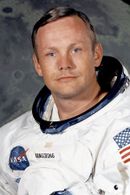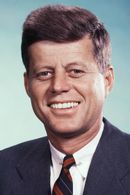Neil Alden Armstrong, an American astronaut and aeronautical engineer, was born on August 5, 1930, in Wapakoneta, Ohio, and passed away on August 25, 2012, at the age of 82.
A graduate of Purdue University, Armstrong studied aeronautical engineering, with his college tuition paid for by the U.S. Navy under the Holloway Plan. He became a midshipman in 1949 and a naval aviator the following year.
During the Korean War, Armstrong flew the Grumman F9F Panther from the aircraft carrier USS Essex and was forced to bail out after his aircraft was damaged in a collision with an anti-aircraft cable. After the war, he completed his bachelor's degree at Purdue and became a test pilot at the National Advisory Committee for Aeronautics (NACA) High-Speed Flight Station at Edwards Air Force Base in California.
Armstrong joined the NASA Astronaut Corps in 1962 and made his first spaceflight as command pilot of Gemini 8 in March 1966. He became NASA's first civilian astronaut to fly in space and performed the first docking of two spacecraft.
During training for his second and last spaceflight as commander of Apollo 11, Armstrong had to eject from the Lunar Landing Research Vehicle moments before a crash. On July 20, 1969, Armstrong and Apollo 11 Lunar Module (LM) pilot Buzz Aldrin became the first people to land on the Moon.
When Armstrong first stepped onto the lunar surface, he famously said: "That's one small step for man, one giant leap for mankind." It was broadcast live to an estimated 530 million viewers worldwide.
After he resigned from NASA in 1971, Armstrong taught in the Department of Aerospace Engineering at the University of Cincinnati until 1979. He served on the Apollo 13 accident investigation and on the Rogers Commission, which investigated the Space Shuttle Challenger disaster.
Armstrong received numerous awards and honors, including the Presidential Medal of Freedom, the 1969 Collier Trophy, and the Congressional Space Medal of Honor.






































































